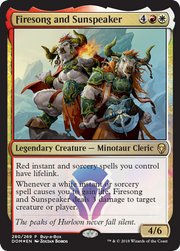mNo edit summary |
|||
| Line 51: | Line 51: | ||
''[[Dominaria]]'' debuted legendary [[sorcery]] cards that capture extraordinary moments from characters' pasts. These powerful spells can be unleashed only with the assistance of a legendary creature or planeswalker on your side of the [[battlefield]].<ref name="Release Notes">[http://media.wizards.com/2018/downloads/DOM_Release_Notes/EN_MTGDOM_ReleaseNotes.docx ''Dominaria'' Release Notes]</ref> |
''[[Dominaria]]'' debuted legendary [[sorcery]] cards that capture extraordinary moments from characters' pasts. These powerful spells can be unleashed only with the assistance of a legendary creature or planeswalker on your side of the [[battlefield]].<ref name="Release Notes">[http://media.wizards.com/2018/downloads/DOM_Release_Notes/EN_MTGDOM_ReleaseNotes.docx ''Dominaria'' Release Notes]</ref> |
||
| − | You can't cast a legendary sorcery unless you control a legendary creature or a legendary planeswalker. Once you begin to cast a legendary sorcery, losing control of your legendary creatures and planeswalkers won't affect that spell. |
+ | You can't cast a legendary sorcery unless you control a legendary creature or a legendary planeswalker. Once you begin to cast a legendary sorcery, losing control of your legendary creatures and planeswalkers won't affect that spell. Other than the casting restriction, the legendary supertype on a sorcery carries no additional rules.<ref>{{TumblrRef|author=[[Mark Rosewater]]|URL=http://markrosewater.tumblr.com/post/171732274783/why-introduce-legendary-sorceries-if-they|title=Why introduce legendary sorceries if they fundamentally can never work the same way as legendary permanents?|tumblr-title=Blogatog|date=March 10, 2018}}</ref> |
==Legendary instants== |
==Legendary instants== |
||
Revision as of 16:13, 21 September 2018
The Magic Duels symbol for Legendary.
Legendary is a supertype of a card. Any permanent (artifact, creature, enchantment, planeswalker, and land) with the legendary supertype is bound by the "legend rule," which prevents multiple copies of the card from existing on the battlefield under the same player's control. Legendary may also appear as a supertype with non-permanents (sorceries and instants). The rules for these are different: you can't cast a legendary non-permanent spell unless you control a legendary creature or a legendary planeswalker. Legendary cards are historic.
Description
Flavorfully, legendary cards represent the key people, places, and objects of a set's story. Typical expansion sets contain no more than 10 to 15 legendary cards, with the exceptions of Dominaria, Kamigawa block, and the early expansion Legends, each of which had a Legendary theme and contained significantly more. Except for cards found in those sets, or in compilation sets, all legendary cards carry a rarity of rare or mythic rare.[1][2]
Legendary was first featured on the lands in the set Legends. Starting with Champions of Kamigawa it also replaced the creature type Legend.[3]
The Commander format requires that a legendary creature be selected as one's deck commander. This excludes legendary planeswalkers (which are not creatures), except for the five appearing in Commander 2014, the Battlebond planeswalker duo "Will Kenrith" and "Rowan Kenrith," and the four appearing in Commander 2018.
Card frame

Legendary card frame, as of Dominaria
Starting with Duel Decks: Elves vs. Inventors and Dominaria, all legendary cards, except planeswalkers, have crown-like flourishes on the title bar of the card frame.[4]
Legend rule
If a player controls two or more legendary permanents of the same name when state-based effects are checked, that player chooses one of those permanents and immediately put the others into their owners' graveyards, without any player having an opportunity to respond. This does not destroy the other permanents, does not cause them to be sacrificed, and cannot be prevented by indestructibility or regeneration.
This version of the rule has been in effect since the release of Magic 2014.[5][6]
Currently, only two cards circumvent the "legend rule." Brothers Yamazaki ignores the rule for itself as long as a player controls exactly two of the card, and Mirror Gallery cancels the rule entirely.
From the glossary of the Comprehensive Rules (April 12, 2024—Outlaws of Thunder Junction)
- Legendary
- A supertype that’s normally relevant on permanents. See rule 205.4, “Supertypes.” See also Legend Rule.
From the glossary of the Comprehensive Rules (April 12, 2024—Outlaws of Thunder Junction)
- Legend Rule
- A state-based action that causes a player who controls two or more legendary permanents with the same name to put all but one into their owners’ graveyards. See rule 704.5j.
From the Comprehensive Rules (April 12, 2024—Outlaws of Thunder Junction)
- 205.4d Any permanent with the supertype “legendary” is subject to the state-based action for legendary permanents, also called the “legend rule” (see rule 704.5j).
From the Comprehensive Rules (April 12, 2024—Outlaws of Thunder Junction)
- 205.4e Any instant or sorcery spell with the supertype “legendary” is subject to a casting restriction. A player can’t cast a legendary instant or sorcery spell unless that player controls a legendary creature or a legendary planeswalker.
From the Comprehensive Rules (April 12, 2024—Outlaws of Thunder Junction)
- 704.5j If two or more legendary permanents with the same name are controlled by the same player, that player chooses one of them, and the rest are put into their owners’ graveyards. This is called the “legend rule.”
Other versions of the Legend rule
From Legends to Champions of Kamigawa
Originally, only one creature of the same name, with the creature type Legend, could be in play at the same time. For a while, they were even on the restricted list, meaning there could be only one creature of the same name in each deck. This was changed around the time of Ice Age.[7][8][9]
Any person could play a Legend provided that that Legend wasn't already on the battlefield. If it was, that card was stuck in its owner's hand. They could cast it if they wanted to, but the newest one would immediately be put into the graveyard, so there was no incentive to do so.
This issue came to great prominence during the Masques block because Rebel decks centered around Lin Sivvi, Defiant Hero were dominant at the time. The card was so key to the deck that when two Rebel decks played one another, the first person to get Lin Sivvi out had an unfair advantage.[10] However, developer Tom LaPille still preferred this version of the rule.[11]
From Champions of Kamigawa to Magic 2014
The second version of the rule checked to see if any other legendary permanent of the same name exists on the entire battlefield (regardless of the permanents' controllers) and sent all of those permanents (including the one which initiated the situation) to their owners' graveyards.[12][13] In effect, each legendary permanent served two purposes: 1) its original purpose and 2) the removal of all instances of that permanent already on the battlefield.
Planeswalker uniqueness rule (obsolete)
From the Comprehensive Rules (April 12, 2024—Outlaws of Thunder Junction)
- 306.4. Previously, planeswalkers were subject to a “planeswalker uniqueness rule” that stopped a player from controlling two planeswalkers of the same planeswalker type. This rule has been removed and planeswalker cards printed before this change have received errata in the Oracle card reference to have the legendary supertype. Like other legendary permanents, they are subject to the “legend rule” (see rule 704.5j).
From the glossary of the Comprehensive Rules (April 12, 2024—Outlaws of Thunder Junction)
- Planeswalker Uniqueness Rule (Obsolete)
- Older versions of the rules stated that a player who controlled two or more planeswalkers with the same planeswalker type would put all but one of those planeswalkers into their owners’ graveyards. This rule was called the “planeswalker uniqueness rule” and no longer exists.
Although different, planeswalker cards used to have a similar rule: If a player controls two or more planeswalkers that share a planeswalker type, that player chooses one of them, and the rest are put into their owners’ graveyards. This was called the “planeswalker uniqueness rule.”[14]
Starting with Ixalan, this rule was abandonded.[15] All planeswalkers past, present, and future gained the supertype legendary and became subject to the "legend rule". Thus, if a player controls more than one legendary planeswalker with the same name, that player chooses one and puts the other into their owner's graveyard. This means for example that if you control Jace, Unraveler of Secrets and cast Jace, Cunning Castaway, both Jaces now can exist under your control.
The change was made to simplify gameplay.[16][17][18]
Rosewater version
Mark Rosewater has stated multiple times that he considers Legendary to be a mechanical downside which he would rather get rid of.[19] If he was starting over he would make Legendary a supertype with no rules baggage. He would create a keyword, called something like Unique, for things that needed for gameplay reasons to restricted to having only one in play.[20][21] The rest of R&D doesn't concur with Rosewater's idea.[22]
Legendary sorceries
Dominaria debuted legendary sorcery cards that capture extraordinary moments from characters' pasts. These powerful spells can be unleashed only with the assistance of a legendary creature or planeswalker on your side of the battlefield.[23]
You can't cast a legendary sorcery unless you control a legendary creature or a legendary planeswalker. Once you begin to cast a legendary sorcery, losing control of your legendary creatures and planeswalkers won't affect that spell. Other than the casting restriction, the legendary supertype on a sorcery carries no additional rules.[24]
Legendary instants
Although covered by the rules, Legendary instants haven't been featured yet.
References
- ↑ Template:NewRef
- ↑ Error on call to {{WebRef}}: Parameters url and title must be specifiedMark Rosewater (March 01, 2018). "". Tumblr.
- ↑ Template:NewRef
- ↑ Template:NewRef
- ↑ Template:NewRef
- ↑ Template:NewRef
- ↑ Template:NewRef
- ↑ Error on call to {{WebRef}}: Parameters url and title must be specifiedMark Rosewater (September 02, 2017). "". Tumblr.
- ↑ Error on call to {{WebRef}}: Parameters url and title must be specifiedMark Rosewater (September 03, 2017). "". Tumblr.
- ↑ Template:NewRef
- ↑ Template:NewRef
- ↑ Template:NewRef
- ↑ Template:NewRef
- ↑ Template:NewRef
- ↑ Template:NewRef
- ↑ Error on call to {{WebRef}}: Parameters url and title must be specifiedMark Rosewater (August 28, 2017). "". Tumblr.
- ↑ Error on call to {{WebRef}}: Parameters url and title must be specifiedMark Rosewater (August 28, 2017). "". Tumblr.
- ↑ Error on call to {{WebRef}}: Parameters url and title must be specifiedMark Rosewater (September 02, 2017). "". Tumblr.
- ↑ Error on call to {{WebRef}}: Parameters url and title must be specifiedMark Rosewater. "". Tumblr.
- ↑ Error on call to {{WebRef}}: Parameters url and title must be specifiedMark Rosewater (September 02, 2017). "". Tumblr.
- ↑ Error on call to {{WebRef}}: Parameters url and title must be specifiedMark Rosewater (August 29, 2017). "". Tumblr.
- ↑ Error on call to {{WebRef}}: Parameters url and title must be specifiedMark Rosewater (August 29, 2017). "". Tumblr.
- ↑ Dominaria Release Notes
- ↑ Error on call to {{WebRef}}: Parameters url and title must be specifiedMark Rosewater (March 10, 2018). "". Tumblr.
